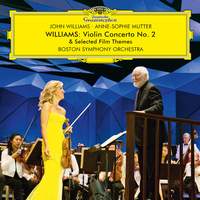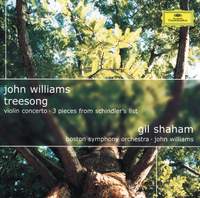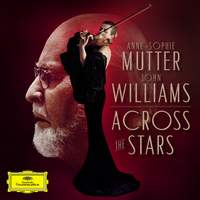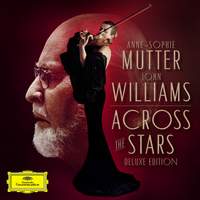Recording of the Week,
John Williams conducts Anne-Sophie Mutter in his new Violin Concerto
With scores for over 100 movies including Star Wars, Indiana Jones, Harry Potter, and Superman, John Williams is arguably the most-listened-to living composer. What is perhaps less well-known is that over the decades he has also been a prolific writer of, for want of a better word, “concert” music. In addition to various ceremonial pieces such as his fanfare for the 1984 Los Angeles Olympic Games, he has under his belt a multitude of concertos for cello, trumpet, horn, flute, tuba, harp, and several other instruments.
 The latest of these, Violin Concerto No. 2, received its world premiere in July last year, with Williams conducting the Boston Symphony Orchestra and its dedicatee, Anne-Sophie Mutter. In fact, Mutter is more than that: she is the prime mover behind the concerto’s very existence. An ardent commissioner of new compositions, she had previously persuaded Williams to write an eight-minute piece, Markings for solo violin, strings, and harp, back in 2017, which they subsequently recorded and included as a bonus download track for Across the Stars, their 2019 collection of arrangements of film themes. When I spoke to her at the time of that album's release, she mentioned that she was pursuing in earnest the idea of convincing Williams to write something more substantial to sit alongside his previous works for violin and orchestra: the Violin Concerto from 1976 and TreeSong from 2001 (both of which have been recorded by Williams and the Boston Symphony with Gil Shaham as soloist).
The latest of these, Violin Concerto No. 2, received its world premiere in July last year, with Williams conducting the Boston Symphony Orchestra and its dedicatee, Anne-Sophie Mutter. In fact, Mutter is more than that: she is the prime mover behind the concerto’s very existence. An ardent commissioner of new compositions, she had previously persuaded Williams to write an eight-minute piece, Markings for solo violin, strings, and harp, back in 2017, which they subsequently recorded and included as a bonus download track for Across the Stars, their 2019 collection of arrangements of film themes. When I spoke to her at the time of that album's release, she mentioned that she was pursuing in earnest the idea of convincing Williams to write something more substantial to sit alongside his previous works for violin and orchestra: the Violin Concerto from 1976 and TreeSong from 2001 (both of which have been recorded by Williams and the Boston Symphony with Gil Shaham as soloist).
For listeners principally familiar with Williams through his many memorable film tunes, what may come as a surprise is quite how little of that sort of thing there is here – extremely rarely is there anything approaching what one might consider a ‘traditional’ melody. The closest is probably a motif first referenced in the central part of the second movement and then explored to a larger extent in the fourth: a wistful, nostalgic motivic gesture reminiscent of Moonlight, a song he wrote for the 1995 film, Sabrina. Elsewhere, it's mostly mood and texture: impressionistic passages, with occasional echoes of Takemitsu and Messiaen (not least the gamelan-tinged sequence of chords that opens the third movement, Dactyls), are set in contrast to more minimalist, toccata-like sections in the second movement, Rounds, in which ever-insistent ostinato patterns lead inexorably to a blazing burst of brass.
Reviews of the premiere performance mentioned that the work was so full of ideas that it never quite seemed to settle down and was hard to grasp on first hearing. I agree to the extent that it took me multiple listenings to appreciate the sheer range of its invention, but I think that ultimately attests to its strength – it constantly teems with new material, none of which outstays its welcome, merely revealing more of its secrets each time. No small amount of credit must also go to Mutter, who unfailingly holds the listener to attention and is in complete command of what she has described as some unbelievably technically challenging passages. Knowing her so intimately as a performer has clearly been a source of inspiration for Williams, whose writing is tailor-made to her abilities, particularly her sweet-toned, fast vibrato that is deployed to tremendous effect throughout, from the quasi-improvisatory, jazz-inflected opening section of the Prologue to the delicate, serene conclusion to the fourth movement Epilogue (in the composer's own words, "a gentle resolution in A major that might suggest both healing and renewal").
Continuing in the spirit of Across the Stars are three film arrangements, including the theme from The Long Goodbye, a fairly obscure 1973 Robert Altman movie based on the Raymond Chandler novel. It’s a marvellously melancholic melody which, in the film itself, is ingeniously treated to all sorts of arrangements including various vocal renditions plus versions for jazz trio, mariachi band and even sitar! Williams continues to demonstrate its versatility here: its original incarnation as a sung melody fits Mutter’s cantabile style like a glove.
Alongside this is a lush new arrangement of Han Solo and the Princess from The Empire Strikes Back. I’ve always felt that the first phrase is somewhat suggestive of the soloist's initial theme from Tchaikovsky’s Violin Concerto, and so it seems appropriate that Williams should arrange it for solo violin and orchestra – in Mutter’s hands the material soars, with ravishing orchestral contributions supporting the warmth of her playing. Combined with a tender account of Marion’s Theme from Raiders of the Lost Ark, these items provide a perfect trio of encores to a magnificent work that strongly deserves a place in the pantheon of great contemporary violin concertos.
Anne-Sophie Mutter (violin), Boston Symphony Orchestra, John Williams
Available Formats: CD, MP3, FLAC, Hi-Res FLAC
Gil Shaham (violin), Boston Symphony Orchestra, John Williams
Available Formats: Presto CD, MP3, FLAC
Anne-Sophie Mutter (violin), The Recording Arts Orchestra of Los Angeles, John Williams
Available Formats: CD, MP3, FLAC, Hi-Res FLAC
Anne-Sophie Mutter (violin), The Recording Arts Orchestra of Los Angeles, John Williams
Available Formats: MP3, FLAC, Hi-Res FLAC






